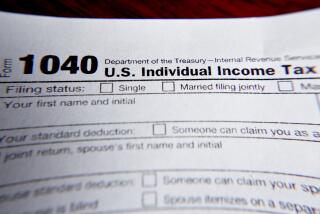Official Says Closing Loophole Would Cut Catastrophic Care Cost
- Share via
WASHINGTON — The overall premium charges for Medicare coverage of catastrophic illnesses would be lowered by plugging a loophole that favors senior citizens with tax-free investment income, the Health and Human Services Department’s inspector general said Thursday.
Inspector General Richard Kusserow said in an audit report that, if tax-exempt interest was included in the income calculation used to figure individual premiums, significant revenues could be generated to reduce premiums and correct an inequity that hurts less affluent beneficiaries.
Auditors said they were unable to estimate how much could be produced by closing the loophole.
“We believe, however, that it is sizable,” the audit said. “Across the country, financial advisers are educating the public on how they can reduce their catastrophic-coverage premium by shifting to tax-free or tax-deferred investments, such as municipal bonds, annuities and mutual funds.”
The inspector general said closing the loophole “would produce savings that could be used, if the Administration and Congress were so inclined, to reduce premiums.”
The audit said the exclusion is unfair to lower income and financially unsophisticated taxpayers who do not own tax-free investments and have no opportunity to avoid paying the premium.
The exclusion of tax-exempt interest also is inconsistent with the way the federal government taxes Social Security benefits. In figuring how much of these benefits can be taxed, Social Security recipients must include tax-exempt income.
The Health Care Financing Administration, in comments included in the audit, rejected the inspector general’s recommendation that it propose legislation to close the loophole. The agency noted that President Bush has said it is too early in the program to start making changes.
The catastrophic-illness coverage program was set up to be funded entirely by the elderly. Senior citizens who object to the supplemental premium they will pay have been pressuring Congress to change the funding mechanism.
To pay for the program, the Medicare Part B premium this year was increased by $4 per month, and Medicare beneficiaries will pay a supplemental premium computed at $22.50 per $150 of federal income tax liability. That premium is scheduled to increase to $42 per $150 by 1993.
The most a person will have to pay this year is $800, or $1,600 for a couple if both partners are eligible for Medicare.
More to Read
Sign up for Essential California
The most important California stories and recommendations in your inbox every morning.
You may occasionally receive promotional content from the Los Angeles Times.










